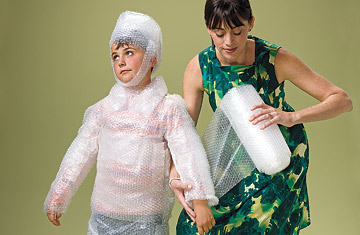
(5 of 8)
Some of the hovering is driven by memory and demography. This generation of parents, born after 1964, waited longer to marry and had fewer children. Families are among the smallest in history, which means our genetic eggs are in fewer baskets and we guard them all the more zealously. Helicopter parents can be found across all income levels, all races and ethnicities, says Patricia Somers of the University of Texas at Austin, who spent more than a year studying the species at the college level. "There are even helicopter grandparents," she notes, who turn up with their elementary-school grandchildren for college-information sessions aimed at juniors and seniors.
Nor is this phenomenon limited to ZIP codes where every Volvo wagon just has to have a University of Chicago sticker on it. "I'm having exactly the same conversations with coaches, teachers, parents, counselors, whether I'm in Wichita or northern Canada or South America," says Honoré. His own revelation came while listening to the feedback about his son in kindergarten. It was fine, but nothing stellar--until he got to the art room and the teacher began raving about how creative his son was, pointing out his sketches that she'd displayed as models for other students. Then, Honoré recalls, "she dropped the G-bomb: 'He's a gifted artist,' she told us, and it was one of those moments when you don't hear anything else. I just saw the word gifted in neon with my son's name ..." So he hurried home and Googled the names of art tutors and eagerly told his son all about the special person who would help him draw even better. "He looks at me like I'm from outer space," Honoré says. "'I just wanna draw,' he tells me. 'Why do grownups have to take over everything?'"
"That was a searing epiphany," Honoré concludes. "I didn't like what I saw." He now writes and lectures about the many fruits of slowing down, citing research that suggests the brain in its relaxed state is more creative, makes more nuanced connections and is ripe for eureka moments. "With children," he argues, "they need that space not to be entertained or distracted. What boredom does is take away the noise ... and leave them with space to think deeply, invent their own game, create their own distraction. It's a useful trampoline for children to learn how to get by."
